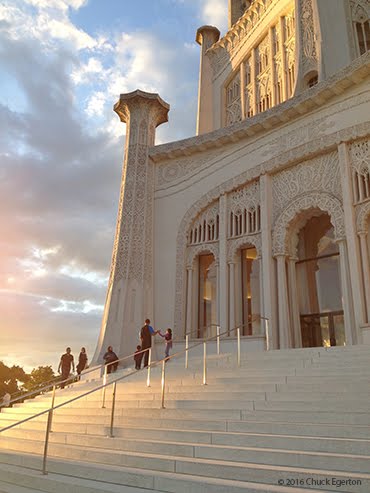"Let me ask your closest attention in considering this subject. The divine religions embody two kinds of ordinances. First, there are those which constitute essential, or spiritual, teachings of the Word of God. These are faith in God, the acquirement of the virtues which characterize perfect manhood, praiseworthy moralities, the acquisition of the bestowals and bounties emanating from the divine effulgences—in brief, the ordinances which concern the realm of morals and ethics. This is the fundamental aspect of the religion of God, and this is of the highest importance because knowledge of God is the fundamental requirement of man. Man must comprehend the oneness of Divinity. He must come to know and acknowledge the precepts of God and realize for a certainty that the ethical development of humanity is dependent upon religion. He must get rid of all defects and seek the attainment of heavenly virtues in order that he may prove to be the image and likeness of God. It is recorded in the Holy Bible that God said, “Let us make man in our image, after our likeness.” It is self-evident that the image and likeness mentioned do not apply to the form and semblance of a human being because the reality of Divinity is not limited to any form or figure. Nay, rather, the attributes and characteristics of God are intended. Even as God is pronounced to be just, man must likewise be just. As God is loving and kind to all men, man must likewise manifest loving-kindness to all humanity. As God is loyal and truthful, man must show forth the same attributes in the human world. Even as God exercises mercy toward all, man must prove himself to be the manifestation of mercy. In a word, the image and likeness of God constitute the virtues of God, and man is intended to become the recipient of the effulgences of divine attributes. This is the essential foundation of all the divine religions, the reality itself, common to all. Abraham promulgated this; Moses proclaimed it. Christ and all the Prophets upheld this standard and aspect of divine religion.

Second, there are laws and ordinances which are temporary and nonessential. These concern human transactions and relations. They are accidental and subject to change according to the exigencies of time and place. These ordinances are neither permanent nor fundamental. For instance, during the time of Noah it was expedient that seafood be considered as lawful; therefore, God commanded Noah to partake of all marine animal life. During the time of Moses this was not in accordance with the exigencies of Israel’s existence; therefore, a second command was revealed partly abrogating the law concerning marine foods. During the time of Abraham—upon Him be peace!—camel’s milk was considered a lawful and acceptable food; likewise, the flesh of the camel; but during Jacob’s time, because of a certain vow He made, this became unlawful. These are nonessential, temporary laws. In the Holy Bible there are certain commandments which according to those bygone times constituted the very spirit of the age, the very light of that period. For example, according to the law of the Torah if a man committed theft of a certain amount, they cut off his hand. Is it practicable and reasonable in this present day to cut off a man’s hand for the theft of a dollar? In the Torah there are ten ordinances concerning murder. Could these be made effective today? Unquestionably no; times have changed. According to the explicit text of the Bible if a man should change or break the law of the Sabbath or if he should touch fire on the Sabbath, he must be killed. Today such a law is abrogated. The Torah declares that if a man should speak a disrespectful word to his father, he should suffer the penalty of death. Is this possible of enforcement now? No; human conditions have undergone changes. Likewise, during the time of Christ certain minor ordinances conformable to that period were enforced.
It has been shown conclusively, therefore, that the foundation of the religion of God remains permanent and unchanging. It is that fixed foundation which ensures the progress and stability of the body politic and the illumination of humanity. It has ever been the cause of love and justice amongst men. It works for the true fellowship and unification of all mankind, for it never changes and is not subject to supersedure. The accidental, or nonessential, laws which regulate the transactions of the social body and everyday affairs of life are changeable and subject to abrogation."
`Abdu'l-Bahá,
The Promulgation of Universal Peace, pp. 403-405
8 November 1912
(excerpt from) Talk at Eighth Street Temple, Synagogue
Washington, D. C.









